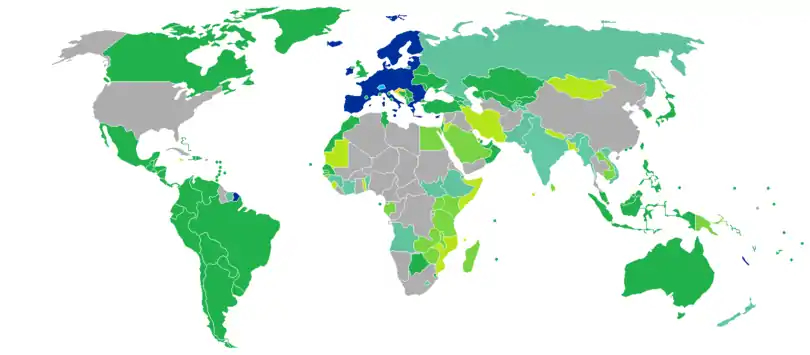Croatian nationality law
The Croatian nationality law dates back from June 26, 1991, with amendments on 8 May 1992, 28 October 2011, and 1 January 2020 and an interpretation of the Constitutional Court in 1993.[1][2][3] It is based upon the Constitution of Croatia (Chapter II, articles 9 and 10). It is mainly based on Jus sanguinis.
| Croatian Citizenship Act | |
|---|---|
 | |
| Parliament of Croatia | |
| |
| Enacted by | Government of Croatia |
| Status: Current legislation | |
Acquisition of Croatian citizenship
Croatian citizenship can be acquired in the following ways:[1][2]
- Jus sanguinis: By descent if at least one of the parents is a Croatian citizen
- Jus soli: By birth in Croatia (one parent must have Croatian citizenship), or a child found in Croatia whose parents are unknown
- By naturalisation
- By international treaties
Citizenship by descent
Under Article 4 of the Law on Croatian Citizenship, a child acquires Croatian citizenship by origin:[1]
- if both of his parents are Croatian citizens at the time of the child's birth;
- if one of his parents is a Croatian citizen at the time of the child's birth and the child is born in the Republic of Croatia;
- if one of the parents is a Croatian citizen at the time of the child's birth, the other parent without citizenship or of unknown citizenship, and the child is born abroad.
Croatian citizenship may also be acquired by a mix of descent and registration, for a child born abroad, one of whose parents is a Croatian citizen at the moment of the child's birth,"if the child is registered for Croatian citizenship by 21 years of age at a competent authority of the Republic of Croatia abroad or in the Republic of Croatia, or if he settles in the Republic of Croatia", or if the child would not otherwise acquire any citizenship.[1]
Citizenship by naturalisation
Under Article 8 of the Croatian Citizenship Act, a foreigner can acquire Croatian citizenship by naturalization if he or she has submitted a request and fulfils the following requirements:[3]
- he or she is 18 years old;
- he or she is released from foreign citizenship, or submits proof that he or she will acquire release if granted Croatian citizenship;
- he or she has lived and has had a registered residence in the Republic of Croatia for at least 8 years without interruption until the submission of the request and has been granted foreigner status with permanent residence;
- he or she is proficient in the Croatian language and Latin script, and is familiar with Croatian culture and social arrangement;
- by respecting the legal order of the Republic of Croatia, by paying public contributions, and that there are no security obstacles for him or her to receive Croatian citizenship.
Moreover, according to Article 11, an emigrant and his or her descendants can acquire Croatian citizenship by naturalisation without meeting the requirements under Article 8, paragraph 1, points 2 - 4 of the Croatian Citizenship Act.[3]
Dual citizenship
Croatia allows its citizens to hold foreign citizenship in addition to their Croatian citizenship.
Under Article 8 of the Law on Croatian Citizenship, naturalisation into Croatian citizenship requires renunciation of the other country's citizenship, where allowed by the other country. However, this does not apply in a number of situations, including descendants of Croatian emigrants, national interest of Croatia, and former Croatians who renounced Croatian citizenship to practice a profession in another country.[1]
Citizenship of the European Union
Because Croatia forms part of the European Union, Croatian citizens are also citizens of the European Union under European Union law and thus enjoy rights of free movement and have the right to vote in elections for the European Parliament.[4] When in a non-EU country where there is no Croatian embassy, Croatian citizens have the right to get consular protection from the embassy of any other EU country present in that country.[5][6] Croatian citizens can live and work in any country within the EU as a result of the right of free movement and residence granted in Article 21 of the EU Treaty.[7]
Travel freedom of Croatian citizens
Visa requirements for Croatian citizens are administrative entry restrictions by the authorities of other states placed on citizens of Croatia. In 2018, Croatian citizens had visa-free or visa on arrival access to 156 countries and territories, ranking the Croatian passport 20th in terms of travel freedom according to the Henley visa restrictions index.[8]
In 2017, the Croatian nationality is ranked twenty-eighth in the Nationality Index (QNI). This index differs from the Visa Restrictions Index, which focuses on external factors including travel freedom. The QNI considers, in addition to travel freedom, on internal factors such as peace & stability, economic strength, and human development as well. [9]
References
- "Law on Croatian Citizenship (unofficial translation) (originally enacted 26 June 1991, and as amended 08 May 1992 and 28 October 2011)" (PDF). EUDO. 19 July 2019.
 This article incorporates text from this source, which is in the public domain.
This article incorporates text from this source, which is in the public domain. - "Acquiring Croatian citizenship". Croatian Ministry of Foreign and European Affairs. Retrieved 19 July 2019.
- "Croatian Citizenship Act (unofficial translation) (originally enacted 26 June 1991, and as amended 08 May 1992 and 28 October 2011 and 1 January 2020)" (PDF). ZAKON. 13 October 2020.
 This article incorporates text from this source, which is in the public domain.
This article incorporates text from this source, which is in the public domain. - "Croatia". European Union. Retrieved 4 May 2015.
- Article 20(2)(c) of the Treaty on the Functioning of the European Union.
- Rights abroad: Right to consular protection: a right to protection by the diplomatic or consular authorities of other Member States when in a non-EU Member State, if there are no diplomatic or consular authorities from the citizen's own state (Article 23): this is due to the fact that not all member states maintain embassies in every country in the world (14 countries have only one embassy from an EU state). Antigua and Barbuda (UK), Barbados (UK), Belize (UK), Central African Republic (France), Comoros (France), Gambia (UK), Guyana (UK), Liberia (Germany), Saint Vincent and the Grenadines (UK), San Marino (Italy), São Tomé and Príncipe (Portugal), Solomon Islands (UK), Timor-Leste (Portugal), Vanuatu (France)
- "Treaty on the Function of the European Union (consolidated version)" (PDF). Eur-lex.europa.eu. Retrieved 2015-07-10.
- "Global Ranking - Visa Restriction Index 2017" (PDF). Henley & Partners. Retrieved 14 March 2017.
- "The 41 nationalities with the best quality of life". www.businessinsider.de. 2016-02-06. Retrieved 2018-09-10.
